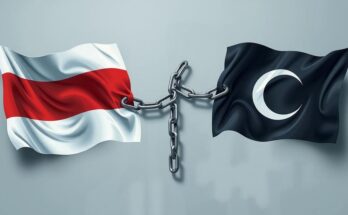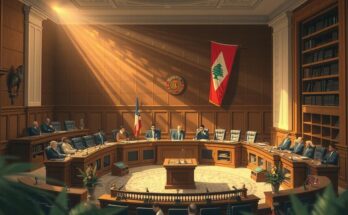Abdullah Ocalan, leader of the PKK, has called for peace and the disbandment of his organization from prison, aiming to end a conflict with Turkey that has lasted over 40 years. His appeal, which has received some support from Turkish officials, could reshape the regional political dynamics significantly. Ocalan retains a complex legacy in the Turkish-Kurdish conflict, emerging as a key figure for peace negotiations despite his controversial history.
Abdullah Ocalan, the 75-year-old leader of the Kurdistan Workers Party (PKK), has spent 25 years in prison after initiating an armed struggle against the Turkish state for Kurdish autonomy. Currently imprisoned on Imrali Island, he recently advocated for peace, urging the PKK to disband and lay down their arms. This initiative, if accepted, could conclude a conflict lasting over 40 years, significantly influencing the geopolitical landscape of the region.
Ocalan’s suggestion emerged four months after an associate of President Tayyip Erdogan encouraged him to call for an end to the violence that has claimed over 40,000 lives and transformed the political scene in Turkey. Both Erdogan and the opposition’s pro-Kurdish Deva party have expressed support for initiatives aimed at ceasing the hostilities, which materially affected southeastern Turkey’s cities and towns.
In his message delivered from prison, Ocalan stated, “I am making a call for the laying down of arms, and I take on the historical responsibility for this call.” His continued influence remains uncertain, especially as the PKK fighters remain largely based in northern Iraq’s mountains. Ocalan’s plea included a recommendation for the PKK to convene a congress to officially endorse disbandment.
The conversation around rekindling negotiations was unexpectedly raised by Devlet Bahceli, a nationalist ally of Erdogan, who hinted at the possibility of Ocalan’s release contingent upon the PKK’s commitment to ending its insurgency. Ocalan highlighted during a 2015 statement that the prolonged struggle had led to significant pain yet remarked that it had become “unsustainable.”
Ocalan’s prominence peaked during the 2013-2015 peace negotiations, where he was seen as a crucial figure by Erdogan. Originally from a peasant family in Omerli, Ocalan’s political thoughts were influenced by urban clashes in the 1970s, leading to his founding of the PKK in 1978 after leaving university. Following his 1999 capture in Kenya, he was sentenced to life imprisonment, a fate he has experienced since.
Abdullah Ocalan, once a powerful figure in the Kurdish insurgency, is now advocating for peace and the disbandment of the PKK from his prison cell. His recent calls for an end to the conflict have garnered attention, with potential support from the Turkish government and opposition alike. Ocalan’s past leadership and ongoing influence remain a pivotal aspect of any future peace negotiations regarding the Kurdish issue in Turkey.
Original Source: indianexpress.com




